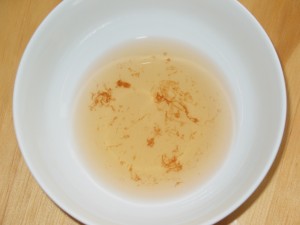Vinegar's mom
May 12, 2010
 [caption id="attachment_588" align="alignleft" width="300" caption="Mother of vinegar."][/caption]
[caption id="attachment_588" align="alignleft" width="300" caption="Mother of vinegar."][/caption]
Recently I used apple cider vinegar to create a brine that I could soak some carrots in (more on that later). When I picked up the bottle, I noticed some weird floating strands in it. Vinegar manufacturers must get this question a lot, because my thought at the time, “what are these floating strands in my vinegar?”, was printed verbatim on the side of the bottle. These, the bottle went on to explain, are called “mother of vinegar”. I will now repeat the bottle’s vague explanation, together with some additional information.
As far as I can tell, vinegar is basically acetic acid in some of kind of alcoholic solution. For example, cider vinegar is cider, with ~5% acetic acid. Just as alcoholic beverages, such as beer, are produced through the action of microorganisms that convert sugar to alcohol, vinegars are produced through the action of microorganisms that convert alcohol to acetic acid. As a result, all vinegars are produced from alcoholic liquids (wine, cider, beer, etc.).
Making vinegar is apparently straightforward, and you may have done it accidentally by not drinking wine quickly enough. Once a bottle is uncorked, the appropriate bacteria - Acetobacter - float in. (Alternatively, you can apparently buy vinegar cultures to be sure that the appropriate bacteria are being used.) In the presence of oxygen, these bacteria create acetic acid.
That’s the basic process, though here is a more detailed set of instructions.
As these bacteria create acetic acid, they also create cellulose. The wispy “mother of vinegar” strands are just cellulose and bacteria. They can be left in, or filtered out, with no ill effects. Here, by the way, is the Wikipedia article on mother of vinegar, and here is the Vinegar Institute’s Vinegar FAQ; both of these were helpful in learning how this works.
By the way, French speakers will recognize the “vin” in vinegar as meaning wine (some English speakers will recognize “vine”, which is etymologically related).
“Egar” comes from an old French word, “aigre”, meaning “sour”, and which shows up in English as “eager”. “Aigre” is ultimately derived from Latin “acer”, meaning “sharp” (“acerbic”, “acrimonious”). So vinegar is literally “sour wine”.